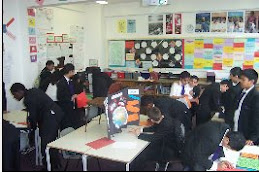I am still seriously damaged from the amazing but shattering experience that was 24-hours in Paris. The students had a fantastic day - 34 degrees of heat belted down as we wandered along the Champs Elysee and cartwheeled under the Eiffel Tower. Apparently the students are going to 'tag' me with their photos (as they left on Monday I have added them as 'friends') so I will share soon.
Taking students on trips is always memorable and usually a positive experience. In the last 3 years I have dragged students to the cinema, Oxford University, World Aids Day festivals, the local council chamber, elderly people activities centres, Tesco, theme parks, Model UN Conference, drug policy brainstorming sessions and KPMG to mention just a few. Some of these required a fair amount of organisation but many were invites I had for activities out of school and I asked if I could bring along students as an extra. For example, the drugs policy sessions was an invite when I was passing my PSHE qualification. They were thrilled at the suggestion of including students. A few permission slips and risk assessments later and 3 students came along to a posh evening on the HMS Belfast at London Bridge.
Trips are also a brilliant bonding tool - giving you and the students something to talk about and reminisce about. Each year when I talk to new TeachFirst teachers they tell me about the places they visited with students and how it helped build relationships with difficult students. Even if you're sceptical or unsure, jump in and try a trip!
A few tips:
1. Always get permission slips and ensure all school paperwork is filled in. A no-brainer but having been on two trips that went very wrong (bus crashes both times) I was so relieved that I had slips for everyone and can't imagine how much more stressful things would be if I was worried a parent would be angry about their child being out.
2. Be careful - but not too careful - of cover implications
Having time out for trips can be tricky if you have classes to cover but don't use this an excuse not to run any trips. I got around this by using free periods, keeping trips short - sometimes only two hours (including travel) - and I would run into breaks/after-school if required. Quite a few of these trips were after-school events too.
3. Give really clear instructions so pupils know what to expect
For instance- when I take students to see West End plays I explain that if a character is musing out loud a question they are NOT expecting an answer and that is NOT your cue to shout out. Indeed, making a point about not shouting out is key all round. Last time I went I took 18 year-olds and skipped this part only to find one of my students on their feet shouting "You go girl!" when a character in the play was asked out on a date.
4. Brief the people you are visiting
I rarely do museum or 'school-trip' activities as I try to get students seeing the 'real world'. Somtimes our East London school reality is different to the reality of the places where we are going so a word in the ear of our hosts is often appreciated so they know what to expect. People who work n the city are often terrified of 'youths' so this helps calm them down too!
5. Always let teachers know in advance if students will miss lessons
And make 'catch-up' work a condition of them being allowed on any trips with you in the future.
6. Stick to time schedules
Be as rigid with time as you can. Famously I left a student behind because he was late for a trip (there were actually good reasons for this, not just my mean-ness) but it meant I have never had a student turn up for a trip late again saving huge headaches. Even yesterday I turned up at school at 3.20am to find a full fleet of tired students and parents raring to go!
7. Take lots of photos
I don't do this enough but I'm learning.
8 months ago
